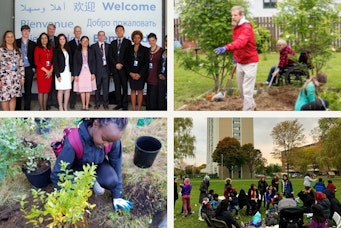Relationship with the Environment
We welcome opportunities to collaborate and partner with organizations working to foster a public discourse about the human relationship with the environment. This is an area of active interest. Below is a brief essay setting out some reflections on this subject.

A Bahá'í Perspective
“Things have never been so good for humanity, nor so dire for the planet,” reads a recent headline. Indeed, much of humanity—and especially many Canadians—have never had it so good in terms of material well-being. While segments of society have been left behind, the majority enjoy wealth unimaginable to our ancestors.
There is a blind spot in our heady rush to material prosperity, however: humanity’s relationship with the environment. It is increasingly difficult to ignore the natural disasters that are battering the planet. A growing unease is evident, as the first clear signals of climate change come to dominate the news. In Canada, events like catastrophic forest fires are becoming common.
Climate is one of a complex set of environmental issues, including the erosion of forests and grasslands, the loss of biodiversity, mounting waste problems, and toxic pollution. Together, these are eroding the ecological conditions of society. The environmental crisis in turn triggers conflict over issues like land rights and federal-provincial jurisdiction. On one side are those who favour unbridled access to resources and on the other those hoping to preserve ecological integrity. The conflict among competing interests breeds disunity, and disunity limits our capacity to solve environmental problems.
The Bahá’í teachings hold that environmental issues have a spiritual dimension. Behind contentious environmental issues is a value system that awards the competitive pursuit of materialistic goals. Identifying and re-examining the underlying values on which the current system is built is a first step in creating an approach that will help us achieve true prosperity and sustainability.
The Bahá’í teachings emerged in the 19th century as the industrial revolution was spreading throughout the world. Among the many principles Bahá’u’lláh taught is that the purpose of our creation is to carry forward an ever-advancing civilization. However, He said that spiritual civilization must advance alongside material civilization.
Identifying the spiritual principles that engender true happiness and sound social relations will assist us in redesigning human civilization in ways that are more sustainable. Today, materialism has been exposed as a shallow substitute for a meaningful, other-centred life. Shifting our focus from the pursuit of material things to the development of our inner capacities and loving relationships is emerging in response to the emptiness experienced in a consumer society.
The principle of unity was identified in the Bahá’í teachings as pivotal to human wellbeing and the preservation of ecological order. The planet, in all its diversity, is now understood to be a unified ecological system. Humanity is no different. The condition of the physical environment is a reflection of the human condition. The deteriorating integrity of planetary systems reflects the disunity that people experience, inwardly and in relation to others. Learning to eliminate all forms of prejudice will allow us to work together to solve complex problems, such as those related to the environment. Only by uniting with the recognition that we are one human family can we solve the problems of one planet – whether these problems presents themselves on a local, provincial, national, or international scale.
A process of building unified communities where individuals realize their potential, and institutions become more effective in contributing to the public good, creates the conditions in which people can work creatively and effectively to solve one of the most pressing requirements of our time, the protection of the physical environment.
Further Reading
More information about this area can be found in the Document Library